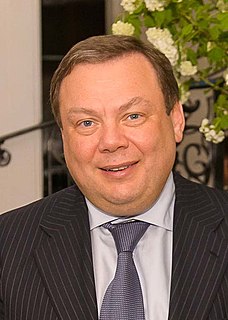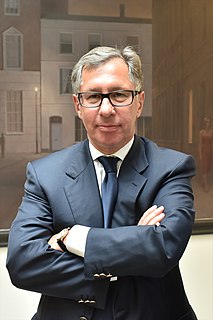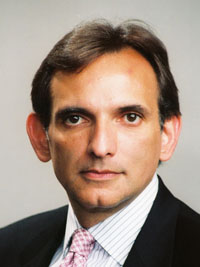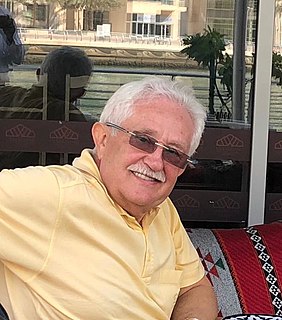
Vladimir Vladimirovich Putin is a Russian politician and former intelligence officer who has been serving as the president of Russia since 2012, having previously served between 2000 and 2008. He was the prime minister of Russia from 1999 to 2000 and again from 2008 to 2012.

Mikhail Maratovich Fridman is a Ukrainian-born, Russian–Israeli businessman, billionaire, and oligarch. Fridman is of Jewish origin. He is one of the co-founders of Alfa-Group, a multinational Russian conglomerate. According to Forbes, he was the seventh-richest Russian as of 2017. In May 2017, he was also ranked as Russia's most important businessman by bne IntelliNews. In August 2022, Fridman had a net worth of $11.2 billion, according to the Bloomberg Billionaires Index.

Boris Abramovich Berezovsky, also known as Platon Elenin, was a Russian business oligarch, government official, engineer and mathematician and a member of the Russian Academy of Sciences.

Sergei Borisovich Ivanov is a Russian senior official and politician who has served as the Special Representative of the President of the Russian Federation on the Issues of Environmental Activities, Ecology and Transport since 12 August 2016.

Andrey Nikolayevich Illarionov is a Russian economist and former senior policy advisor to Vladimir Putin, the President of Russia, from April 2000 to December 2005. Since April 2021, he is a senior fellow at the non-governmental organization Center for Security Policy, which is based out of Washington, D.C. in the United States.

Nikolai Platonovich Patrushev is a Russian politician, security officer and intelligence officer who has served as the secretary of the Security Council of Russia since 2008. He previously served as the director of the Federal Security Service (FSB) from 1999 to 2008. Belonging to the siloviki faction of president Vladimir Putin's inner circle, Patrushev is believed to be one of the closest advisors to Putin and a leading figure behind Russia's national security affairs.

Suleyman Abusaidovich Kerimov is a Russia-based billionaire, oligarch, and politician of Lezgian origin. Kerimov has close ties to Vladimir Putin's government in Russia, as well as Ramzan Kadyrov, the Chechen leader.
Yuri Borysovych Shvets is a former Soviet intelligence officer of Ukrainian origin. He was a Major in the KGB between 1980 and 1990. From April 1985 to 1987, he was a resident spy in Washington, D.C. While there, he held a cover job as a correspondent for TASS, a Soviet state-owned news agency.
Vladimir Alexeyevich Smirnov is a prominent Russian businessman, former Director General of the Petersburg Fuel Company (1997–1998), former Chairman of the Board of Directors of the Petersburg Fuel Company (1999–2001). In 2002–2007 he was the Director General of Tekhsnabexport (TENEX) which carries out export of goods and services produced by Russian nuclear enterprises.

Petr Olegovich Aven is a Russian oligarch, businessman, economist and politician who also holds Latvian citizenship. Until March 2022 he headed Alfa-Bank, Russia's largest commercial bank. In March 2022, he resigned from the board of directors at Alfa-Bank and LetterOne Group to help them avoid sanctions. In 2022 he was named the 665th richest person in the world, with a net worth of around $4.7 billion.
A diverse variety of informal political groups emerged during the presidency of Vladimir Putin. They include remnants of the Yeltsin family, Saint Petersburg lawyers and economists, and security-intelligence elements called the siloviki.

Gunvor Group Ltd is a Cypriot-domiciled multinational commodity trading company registered in Cyprus, with its main trading office in Geneva, Switzerland. Gunvor also has trading offices in Singapore, the Bahamas, and Dubai, with a network of representative offices around the globe. The company operates in the trade, transport, storage and optimization of petroleum and other energy products, as well as having investments in oil terminal and port facilities. Its operations consist of securing crude oil upstream and delivering it to market via pipelines and tankers.
Banque Commerciale pour l’Europe du Nord (BCEN) or Banque Commerciale pour l'Europe du Nord – Eurobank (BCEN-Eurobank) was a Soviet-controlled bank in Paris, founded in 1921 by wealthy Russian emigres and supported by Leonid Krasin who, in 1925, sold their stakes to the USSR. It maintained correspondent accounts with Western banks to secure lines of credit for facilitating Communist imports into that country in which the correspondent account is located. Also, these correspondent accounts performed foreign currency exchange for the Kremlin.

Carlos Pascual is a Cuban-American diplomat and the former U.S. Ambassador to Mexico and Ukraine under President Barack Obama and Bill Clinton respectively. He served at the U.S. Agency for international Development from 1983 to 1995, and at the White House National Security Council from 1995 to 2000, ultimately as senior director for Russia, Ukraine and Eurasia. He was the State Department Coordinator for U.S. Assistance to Europe and Eurasia, and subsequently the Coordinator for Reconstruction and Stabilization from 2003 to 2005. Later he served at the Brookings institution and was appointed Special Envoy and Coordinator for International Energy Affairs at the State Department's Bureau of Energy from 2011 to 2014.
Russian espionage in the United States has occurred since at least the Cold War, and likely well before. According to the United States government, by 2007 it had reached Cold War levels.

Boris Birshtein, born 11 November 1947 in Lithuania, is a businessman and the former chairman of Seabeco, an investment and trading company.

Putinism is the social, political, and economic system of Russia formed during the political leadership of Vladimir Putin. It is characterized by the concentration of political and financial powers in the hands of "siloviks", current and former "people with shoulder marks", coming from a total of 22 governmental enforcement agencies, the majority of them being the Federal Security Service (FSB), Ministry of Internal Affairs of Russia, Armed Forces of Russia, and National Guard of Russia. According to Arnold Beichman, "Putinism in the 21st century has become as significant a watchword as Stalinism was in the 20th."
Maria Vorontsova, also referred to as Maria Faassen, is a Russian pediatric endocrinologist. She is the eldest child of Russian president Vladimir Putin.
Catherine Belton is a journalist and writer. From 2007 to 2013, she was the Moscow correspondent for the Financial Times. In Putin's People: How the KGB Took Back Russia and Then Took On the West, published in 2020, Belton explored the rise of Russian president Vladimir Putin. It was named book of the year by The Economist, the Financial Times, the New Statesman and The Telegraph. It is also the subject of five separate lawsuits brought by Russian billionaires and Rosneft.
Russian money has been prevalent in London since the dissolution of the Soviet Union in 1991, following which many Russian oligarchs sought to invest their wealth in other countries. British Government policy encouraged the flow of foreign capital into the United Kingdom, for example through the foreign investor visa routes, introduced during John Major's premiership in 1994, one-fifth of whose recipients since 2008 are Russian citizens. Additional funds flow to British overseas territories, commonly used as tax havens, such as the Cayman Islands and British Virgin Islands. The concept is commonly associated with the terms "Londongrad" and "Moscow-on-Thames".












